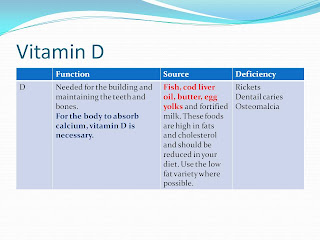Friday 10 June 2011
Concept of Balance Diet
A balance diet is one which contains the correct proportions of all the different food requirement of the body.
A balanced diet should supply enough energy for each day activities
A balance diet consist of the following food requirement
Carbohydrates and lipids to provide energy for all the activities in the body
Protein to build new tissues for growth and repair damaged tissues
Vitamins to prevent diseases and for normal healthy development
Mineral salts which are essential for normal healthy growth and development
Fibres as roughage to stimulate peristalsis and prevent constipation
Water which is needed as medium for all chemical reactions in the cells. It helps to transport substances that are needed by the cells and remove metabolic wastes. It also help to distribute and regulated body heat
Factors affecting the daily energy requirement of the body
Individual requires energy that is sufficient to carry out all living processes such as heart beating, breathing, growing, excreting and regulating body temperature of 37 C
Energy is obtained from the oxidation of glucose during cell respiration
The unit for energy is joule (J)
The energy value or calorific value is the quantify of heat produced when one gram of food is completely oxidised. Example of energy value in certain food are as follow
Carbohydrates 22.2 kJ per gram
Protein 17.2 kJ per gram
Lipids – 38.5 kJ per gram
One calorie or 4.2 J is the quantity of heat required to raise temperature of 1 gram of water by 1C. The energy value in a certain food can be determined by using the following formula
Energy value = (Mass of water gram x Increase in temp C x 4.2) mass of food (g)
The daily energy requirement of the body varies from individual to individual and depends on the following factors
Age
Sex
Body size and weight
Occupation
Subscribe to:
Post Comments (Atom)





























Your article is very helpful.
ReplyDeleteThank you for this article its really very helpful.Diet Specialistin Ludhiana
ReplyDelete